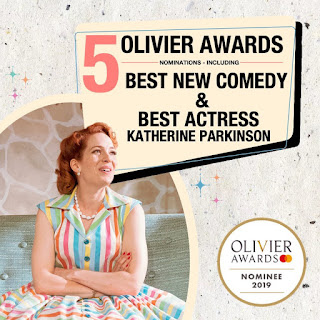 After
a sold-out successful run at the Chocolate Factory, this beautiful moving
production of Fiddler on the Roof transfers to the Playhouse on the other side
of the river for a thirty-two-week run and expands to fill the venue. The
transformation of the stalls into the rural Russian village with a thrust stage
is exquisite and creates a perfect setting for the emotional dramatic tale of a
changing society with traditions breaking down and love blossoming.
After
a sold-out successful run at the Chocolate Factory, this beautiful moving
production of Fiddler on the Roof transfers to the Playhouse on the other side
of the river for a thirty-two-week run and expands to fill the venue. The
transformation of the stalls into the rural Russian village with a thrust stage
is exquisite and creates a perfect setting for the emotional dramatic tale of a
changing society with traditions breaking down and love blossoming.
In
some ways the structure of Joseph Stein's book and Jerry Bock's music creates a
challenge for the director and cast. We are served with the best three songs in
the first thirty minutes with the opening "Tradition" followed with
"Matchmaker, Matchmaker" and "If I were a rich man" and
nothing that follows quite matches these wonderful songs. They do elegantly set
up the situation and the central characters and their relationship, so you
start to care about them as a family with the central roles of Mama and Papa.
The slow breakdown of tradition and matchmaking and the revolution spreading
through Russia is the context for rest of the musical. But as the story gets bleaker,
so the emotional connection with Tevye's family grows. In Trevor Nunn's
direction he brings out every comic moment and every heart wrenching breakdown
in the traditions.
Nunn's
groupings are excellent and the choreography with Matt Cole recreating some of
Jerome Robbins original routines look amazing in the big set piece moments like
the Wedding and Bottle dance that ends Act One or the drunken dance in the bar
in "To Life". The band slips down the steps from their raised
platform to accompany the dancers and create magical pictures for the audience.
The
lighting design by Tim Lutkin skilfully illuminates Robert Jones's village roof
tops and creates the atmospheric setting from the beautiful Sunset through the
trees to the bleak winter of the finale. I don't think I have seen a more
effective lighting design in the West End for years.
This
may be a story of Jewish oppression in the last century but it's messages of
love and hope in the face of adversity resonate strongly in today's troubled
society and the enduring songs take you on an emotional rollercoaster that is a
joy.
Nick
Wayne
⭐️⭐️⭐️⭐️






